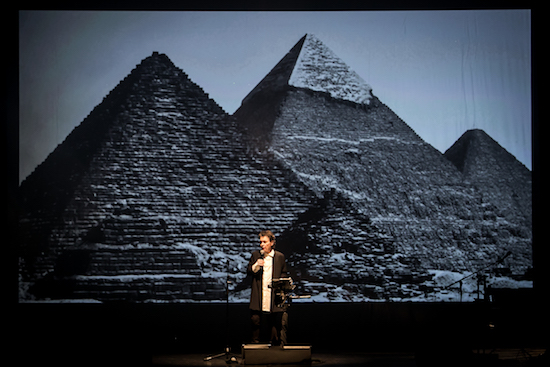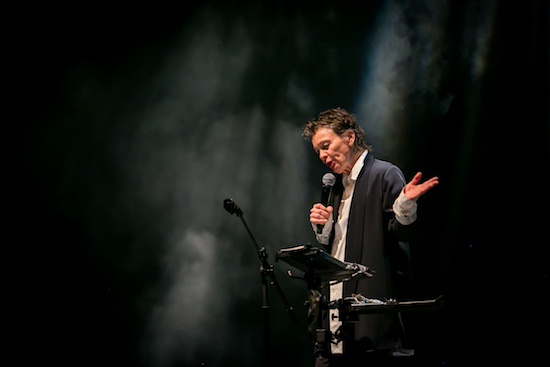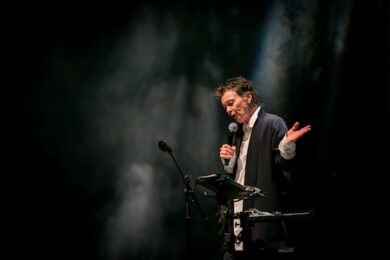Laurie Anderson begins Slideshow by saying that this world premiere was originally intended to be her stand-up comedy debut. According to this story, Brighton Festival- for which she is this year’s guest director- weren’t too keen on the idea, on the grounds that she’d never done it before and so maybe she should try it out in a smaller venue first; and also because she admitted that she only knew two jokes. So that plan was abandoned, Laurie claims, and this in fact is Plan B.
It’s a cute story, and it sounds plausible. But as Slideshow develops over the course of two hours, it emerges that its primary theme is the untrustworthiness of stories, especially the cute and plausible ones. These are the stories we tell, to ourselves and others; the stories we choose to believe; that define our sense of reality. And running parallel to this is the notion of Plan B itself; what do we do when the stories we tell ourselves no longer work.
In fact, Slideshow does still loosely follow a stand-up comedy format. Sharp and punk-elegant, Anderson roams the stage with a microphone in her hand, moving from a lectern at one side to an armchair at the other, while appropriate projections play out behind her. We get a few minutes of her trademark tape bow violin, but otherwise this is mostly just Anderson telling stories, unaccompanied. Being Laurie Anderson of course, this is the kind of stand-up comedy where a retelling of Aristophanes’ The Birds counts as a shaggy dog routine. We do get to hear both of her jokes, and while neither one is particularly funny, they do perfectly illustrate how we cling to our stories, no matter how pointless they are or how many other equally valid story-options also exist, and how these stories shape our perception of the world we live in- at least, until the moment they fall apart.
Anderson’s delivery is so casual, so New York Zen-existential, that’s it’s only in thinking about it afterwards that you realise how powerful a work this is. Early on she speaks about being invited to be an artist-in-residence at NASA, and questioning how photos of space are made to look like paintings of heaven by adding colours that don’t exist, specifically chosen because the scientists think people might like them. But like a photo of Earth taken from orbit, it’s only with a certain amount of distance that you realise, with no little degree of awe, the web of connections and imagery linking these seemingly random, sort-of funny, sometimes desperately sad stories together into a quietly devastating whole.
Like her former collaborator, William Burroughs, Anderson is preoccupied by language; how it forms and obscures our world, and how often we mistake the map for the territory. A demonstration of how to use a hotel pillow speaker as a DIY vocoder turns into a funny story about how she got one stuck in her mouth when the glue leaked out of it. Though the point isn’t laboured, this could be a metaphor for how we are trapped by the words we use. She talks about the militarisation of language, and repeatedly about the concept of home, and how this has been altered by phrases like "homeland security" where home is defined by the building of walls. Donald Trump comes up repeatedly, as an extreme example of someone telling a great number of people a story that they desperately want to believe, but which is dangerous and untrue. However, as she points out, we all vote for the politicians whose stories we like the best.

Anderson however is much warmer than Burroughs. She retains a powerful love and belief in humanity, even after its stories are dismantled. This is displayed in her account of observing the Mars Rover landing, and also in watching an audience of Americans all mouthing "I’m sorry" into a video link-up with the youngest-ever detainee at Guantanamo Bay. Even when she seems to be at her most cynical, such as when talking about the hearty outward bound types who came to noisily dominate what she hoped was a Buddhist expedition to the Utah desert in search of silence and emptiness, Anderson flips the tale on its head so that it becomes about her own damaging preconceptions.
Most immediately powerful is a rendition of ‘A Story About A Story,’ one of the most moving and memorable parts of Anderson’s recent film and album Heart of a Dog. In many ways this is the show’s centrepiece, a heart-breaking account of how our stories about ourselves become less true each time we tell them, precisely because we focus on ourselves and gradually forget the wider picture. Whether talking about her childhood, wartime poetry codes, a visit to an Amish community or the impact of being overwhelmed by too much choice and too much information, thanks to advancing technology and the commercial forces that drive it, Anderson’s imagery and themes are lightly deployed, unobtrusive but perfectly chosen, as subtly telling as a series of haikus.
Slideshow ends with a musical piece. Using her voice filter to shift into a lower register- the "voice of authority" Lou Reed apparently dubbed ‘Fenway Bergamot’- Anderson reveals our sense of home to be just another comforting, unreal story. What do you do when the person you thought you’d spend your life with is gone; when without that person to share it with, there is no home anymore? This is the Plan B Anderson is exploring; how to survive when there is only change, chaos, and humanity, forever striving to find meaning in the darkness. As the lights come up, I’m reminded of Russian philosopher Vasily Rozanov’s famous lines: "The show is over. The audience get up to leave their seats. Time to collect their coats and go home. They turn round. No more coats. No more home."



